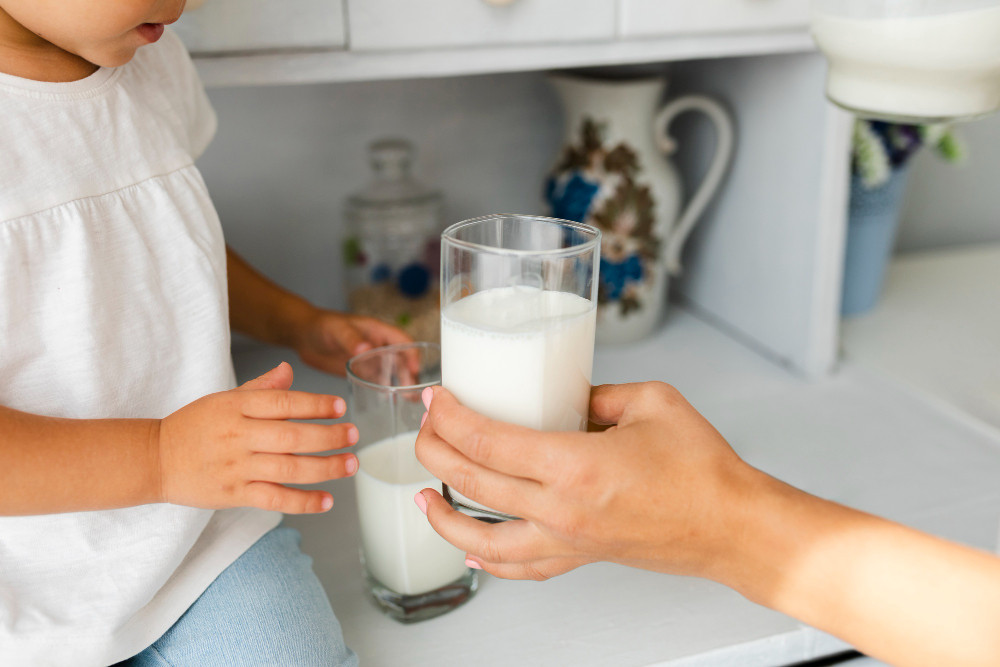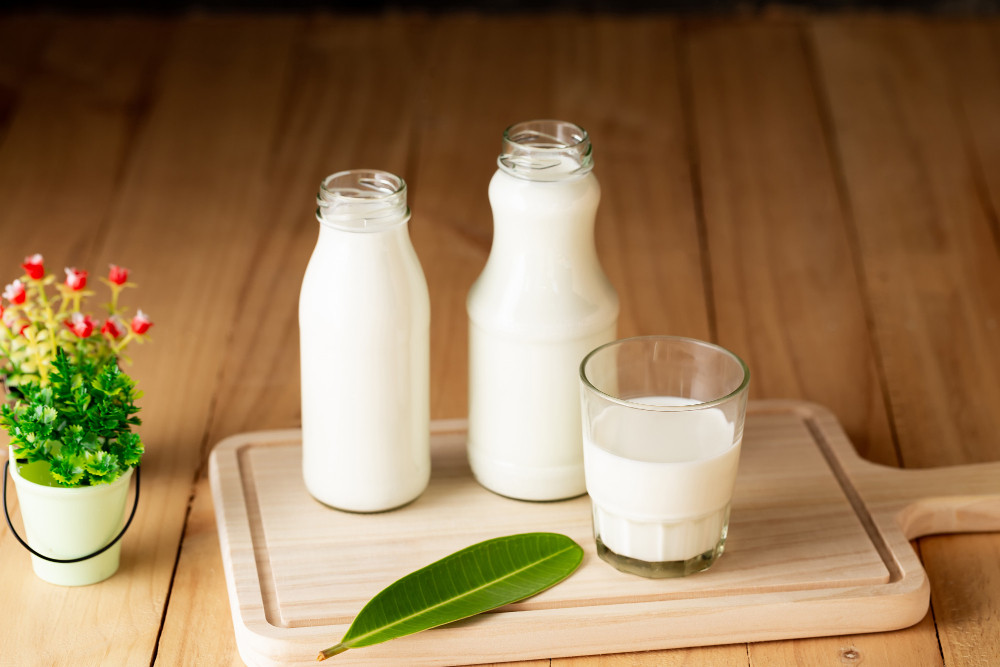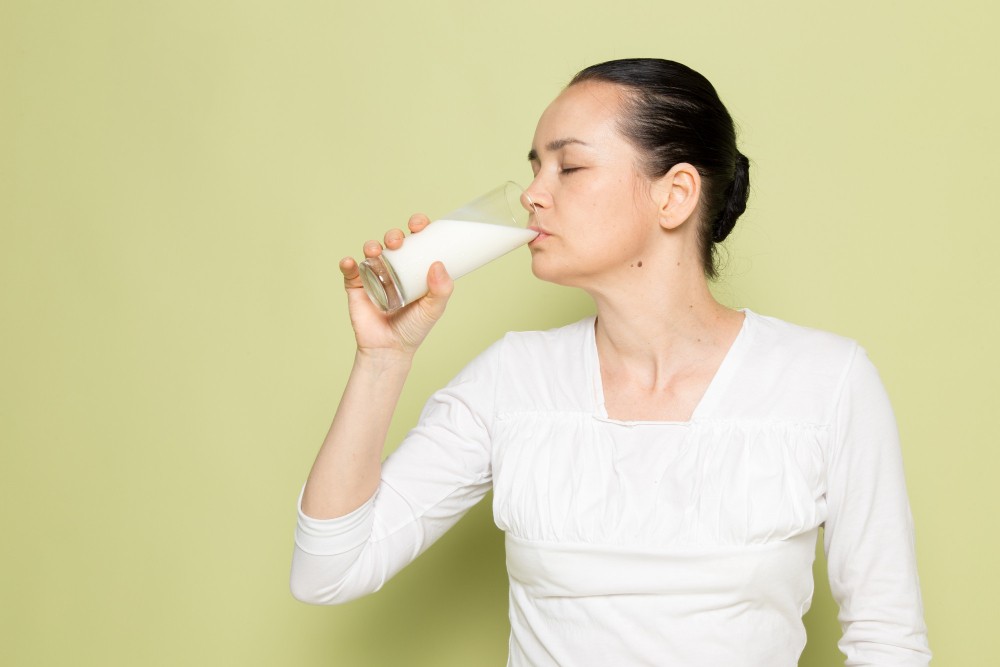Susu sapi merupakan minuman sumber kalsium, protein dan lemak yang dapat membantu memenuhi kebutuhan nutrisi tubuh. Namun susu sapi dikenal memiliki kandungan lemak tinggi sehingga banyak yang membatasi konsumsi susu sapi. Selain susu sapi murni, ada juga susu skim yang memiliki kandungan lemak lebih rendah dari susu murni. Benarkah susu skim lebih sehat?
Apa Itu Susu Skim?
Susu sapi adalah salah satu minuman bernutrisi yang mudah diakses dan mudah didapat di berbagai tempat. Umumnya olahan susu sapi biasanya diberi label berdasarkan kandungan lemaknya. Jenis susu sapi yang beredar di pasaran antara lain:
- Susu murni, biasanya diberi label sebagai susu yang penuh lemak (full fat) atau susu dengan vitamin D. Pada susu jenis ini tidak ada kandungan lemak yang dihilangkan selama pemrosesan.
- Susu rendah lemak, biasanya dalam kemasan tertulis sebagai low fat atau tertulis berapa kadar lemak dalam susu tersebut. Beberapa kadar lemak dalam susu telah dihilangkan tetapi masih memiliki rasa lembut dan rasa susu murni.
- Susu skim, diberi label sebagai susu tanpa lemak. Pada susu jenis ini lemak susu dihilangkan sehingga susu tidak mengandung lemak dan teksturnya lebih encer.
Baca Juga: Kandungan Nutrisi Susu Almond (Almond Milk) dan Risiko Mengonsumsinya
Perbandingan Nutrisi Susu Skim dan Susu Murni
Selain lemak yang dihilangkan, susu skim juga memiliki sejumlah perbedaan nutrisi lainnya dengan susu murni. Berikut ini perbedaan kandungan nutrisi susu dalam 246 gram susu skim dengan susu murni:
| Susu murni | Susu skim | |
| Kalori | 152 | 83,6 |
| Protein | 8,14 g | 8,44 g |
| Lemak | 7,97 g | 0,19 g |
| Karbohidrat | 11,5 g | 12,1 g |
| Lemak jenuh | 4,63 g | 0,12 g |
| Kalsium | 306 mg | 325 mg |
| Vitamin D | 2,39 mcg | 2,71 mcg |
| Vitamin A | 79,7 mcg | 157 mcg |
| Yodium | 94,4 mcg | 87,8 mcg |
Tabel 1. Kandungan Nutrisi Susu Murni dan Susu Skim
Dari tabel tersebut dapat terlihat bahwa selain kalori dan lemak, susu murni dan susu skim tidak memiliki perbedaan kandungan mikronutrisi yang signifikan. Lemak dalam susu membantu tubuh menyerap vitamin yang larut dalam lemak seperti A, E, dan D. Pada susu skim, produsen umumnya menambahkan vitamin A dan D agar Anda tetap bisa mencukupi kebutuhan vitamin A dan D meski tanpa lemak tambahan.
Baca Juga: Rekomendasi Susu Nabati Sebagai Pengganti Susu Sapi
Mana yang Lebih Sehat, Susu Skim atau Susu Murni?
Banyak orang yang menghindari mengonsumsi susu murni karena kandungan lemaknya yang tinggi. Berdasarkan kebutuhan tersebut, produsen kemudian memproduksi susu skim yang bebas lemak. Susu rendah lemak dianggap lebih baik bagi kesehatan karena tidak mengandung lemak jenuh dan kalori tinggi.
Kandungan lemak pada susu murni terbilang cukup tinggi, sehingga jika dikonsumsi rutin dapat berisiko meningkatkan asupan lemak jenuh pada tubuh. Kandungan lemak jenuh tinggi dapat meningkatkan risiko penyakit kardiovaskular seperti penyakit jantung.
Bagi Anda yang menghindari lemak tak jenuh, dapat memilih susu skim sebagai pilihan minuman kesehatan. Namun meskipun memiliki kandungan lemak lebih sedikit, sebaiknya Anda tidak mengonsumsi susu skim berlebihan. Dalam sehari sebaiknya Anda membatasi konsumsi susu skim sebanyak maksimal 3 cangkir per hari. Mengonsumsi susu skim berlebihan dapat meningkatkan risiko iritasi saluran pencernaan yang menyebabkan diare.
Susu skim bisa menjadi pilihan bagi Anda yang sedang diet, membatasi asupan lemak dan memiliki kolesterol tinggi. Jika Anda memiliki pertanyaan seputar kesehatan sebaiknya konsultasikan ke dokter atau manfaatkan fitur konsultasi pada aplikasi Ai Care.
Mau tahu informasi seputar nutrisi, makanan dan tips diet lainnya? Cek di sini, ya!
- dr Nadia Opmalina
WebMD Editorial Contributors. (2023). Available from: https://www.webmd.com/diet/what-to-know-about-skim-milk
Shatzman, C. (2023). Is Whole Milk Better Than Low Fat and Skim Milk?. Available from https://www.healthline.com/nutrition/whole-vs-skim-milk
Kids Health. Does Nonfat Milk Provide the Same Nutrients as Whole Milk?. Available from: https://kidshealth.org/en/parents/skinny-skim-milk.html
Richards, L. (2021). Which type of cow's milk is the healthiest?. Available from: https://www.medicalnewstoday.com/articles/whole-vs-skim-milk












